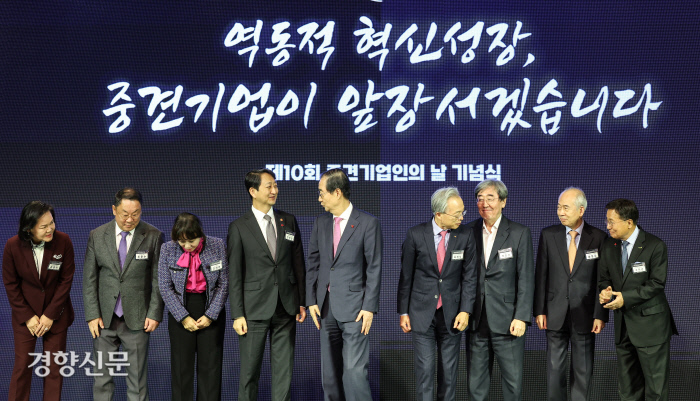Ruling Party Proposes ‘High-Level Government Consultations’, Opposition Suggests ‘National Stability Consultation’, Han Suggests “Both Should Be Done”
Deferring Discussion on Six Legislative Issues to the 17th… Temporary Cabinet Meeting Called Within the Week
Democratic Party Reiterates “The Acting Authority Doesn’t Have the Power to Exercise Veto”,

Acting President Han Duck-soo (fifth from left) attending the Mid-Sized Enterprise Day event on the 16th at The Plaza Hotel in Seoul, talking with Trade, Industry, and Energy Minister Ahn Deok-geun. Photo by Kim Chang-gil
,
‘Acting President Han Duck-soo is adopting a ‘two-track’ strategy by accepting both consultation proposals suggested by the ruling and opposition parties for national stability. This signifies a formal ‘neutral gear’ approach amidst the power struggle between the ruling and opposition parties following President Yoon’s suspension. However, Han’s stance may become clearer depending on whether he exercises the veto power over legislative bills like the Grain Management Act, led by the opposition. Reports suggest that Han is leaning towards vetoing these bills.’,
‘On the 16th, during the ‘Mid-Sized Enterprise Day’ celebration in a hotel in Seoul, Han remarked, “We will further strengthen cooperation and collaboration with the National Assembly and the political circles,” and expressed the idea of establishing a single consultative body involving both political parties and the Speaker of the National Assembly. A senior government official, speaking in a phone call, mentioned the proposals from Kwon Seong-dong, the floor leader of the People Power Party, for resuming high-level and practical government consultations, and the request from Lee Jae-myung, leader of the Democratic Party, for a consultative body including the government and the National Assembly to stabilize the administration, saying, “We must do both.”’,
‘A Prime Minister’s office official stated that they were ready to actively cooperate with the National Assembly, including both parties, to stabilize the government swiftly according to the Constitution and laws. At the same time, the government expressed that the proposal by Leader Kwon to resume existing systems should be reinstated.’,
‘Han’s neutral stance reveals the uncomfortable position he is in, being a figure from the ruling party but needing to heed the opposition’s stance. Han became the acting president due to President Yoon’s declaration of martial law and has been critiqued for being a co-conspirator as he participated in the cabinet meeting before the declaration.’,
‘However, Han’s neutral approach might not last long. The first test lies in whether he will veto the Agricultural Four Laws amendment bills, including the Grain Management Act, passed by the National Assembly under the opposition’s lead, as well as the amendments to the National Assembly Law and the National Assembly Testimony Law. These are all bills that the Yoon government opposes, and the deadline for vetoing is the 21st. The decision to accept or reject these bills needs to be made at the routine cabinet meeting on the 17th or at an additional temporary cabinet meeting scheduled within the week.’,
‘Han is in deep contemplation. They have decided not to bring these bills to the cabinet meeting on the 17th. A Prime Minister’s office official, speaking with reporters at the government complex in Seoul, mentioned, “The six bills, including the Grain Management Act, will not be presented at tomorrow’s cabinet meeting because sufficient consideration and discussion are deemed necessary.” The official continued, “As stated yesterday by the acting president, we plan to make all decisions in accordance with the Constitution and laws for the country’s future and communicate with the National Assembly while the deadline permits.”’,
‘According to an investigation by Kyunghyang Shinmun, Han is leaning towards exercising the veto on these bills. Government sources interpret his stance as being able to veto any bill deemed unconstitutional or unlawful. The Ministry of Agriculture, Food and Rural Affairs and the Ministry of Economy and Finance have already advised President Yoon to veto these bills. Leader Kwon is also in favor of triggering the veto. It appears Han is revisiting the process, considering the current political landscape.’,
‘If Han ultimately exercises the veto, it is expected that the opposition’s pressure will intensify. At a top committee meeting, Democratic Party Supreme Commissioner Kim Min-seok warned, “As an acting prime minister, you do not have the active authority to exercise legal veto power.”’

